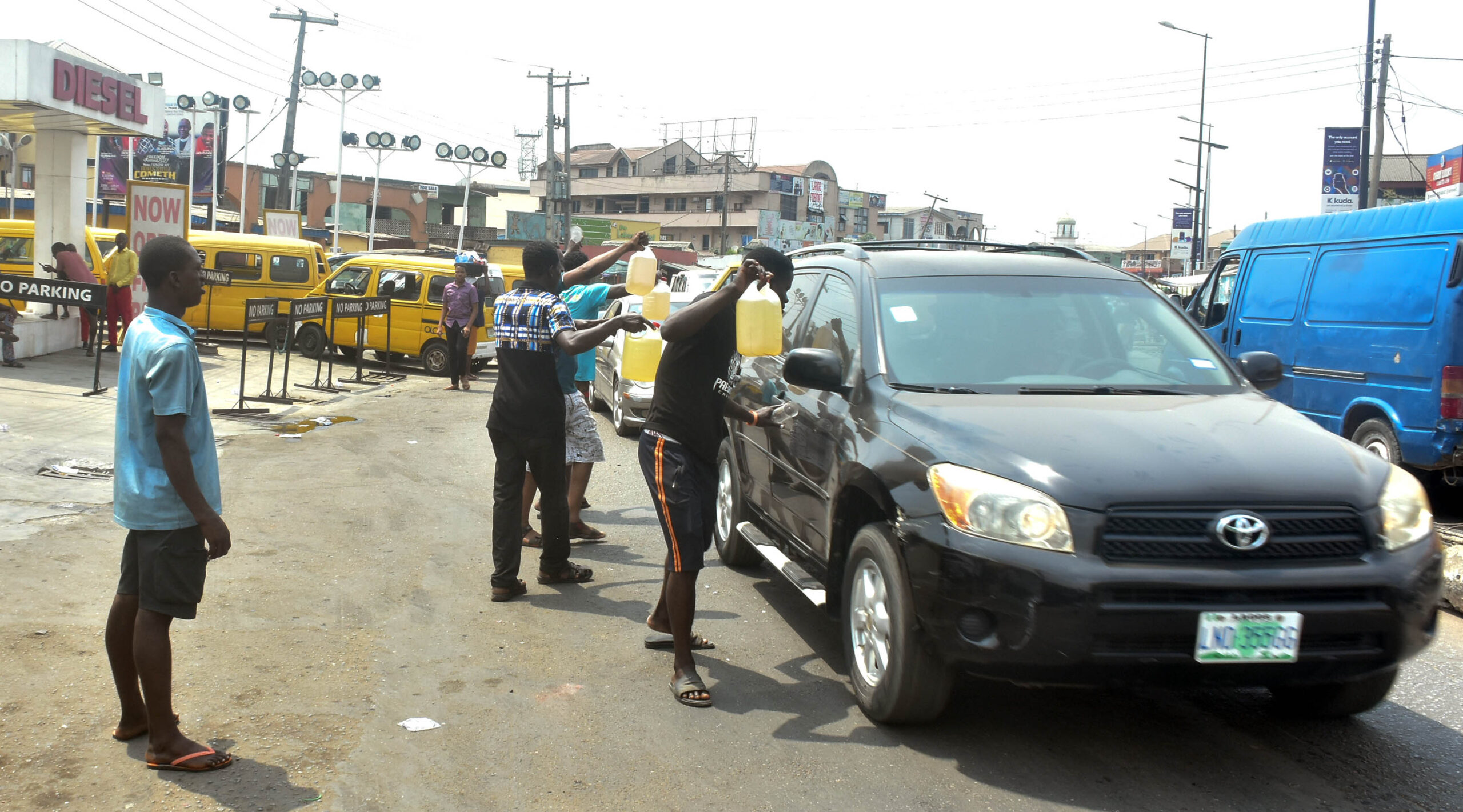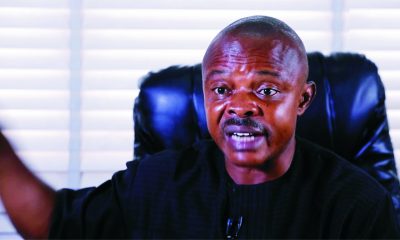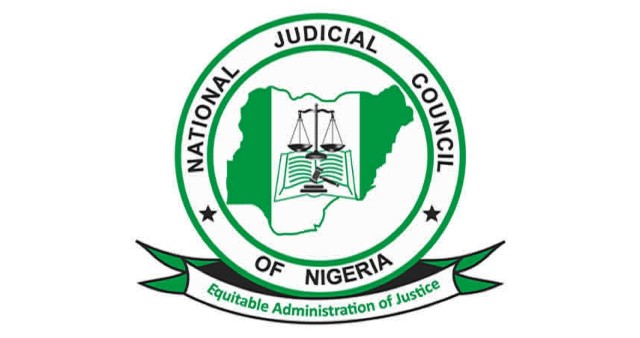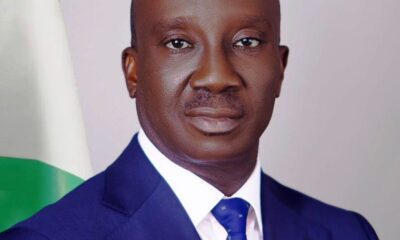Business
Manufacturers Groan As Price Of Diesel Hits N520 Per Litre

The organised private sector yesterday raised alarm that the current spike in the pump price of diesel to between N520 and N560 per liter would triple the cost of production and accelerate inflationary pressure on the economy.
The massive rise in the price of diesel is causing discomfort for manufacturers and businesses because they now rely heavily on it to power their generators following epileptic public power supply.
President of the Lagos Chamber of Commerce and Industry (LCCI), Michael Olawale-Cole, who spoke to newsmen yesterday on the prevailing high cost of diesel, said the escalation in the price of diesel would be a double jeopardy for manufacturers and portends a hard time that could even threaten their survival and competitiveness.
Olawale-Cole told newsmen that the prevailing prices of diesel, as well as current petrol scarcity “are totally unacceptable,” warning that “if we are not careful the economy and Nigerians will suffer for it.”
He attributed the trend in the domestic price of diesel to the rising price of crude oil in the international market, which is impacting on its landing price in Nigeria.
“The rising price of crude oil is part of it. The current scarcity of petrol is now influencing the diesel market.
“However, the answer to all these problems is to ensure that we are adding value to our crude oil here and stop depending on imported refined products. That is the solution and can be met by government showing commitment to ensure that our existing refineries are maintained and made to work.
“It is agonising that we are producing crude and exporting them abroad for refining and later import them at prices that we cannot afford. Naturally, this is going to affect inflation and add to the suffering of the people”, he said.
A member of the Manufacturers Association of Nigeria (MAN), who spoke anonymously to newsmen yesterday on the prevailing high cost of diesel said: “We will suffer for this as we generate our own power at a very high cost of diesel whose price has climbed from N380 in December 2021 to over N400 in January and is now selling above N500.
“It will triple our cost of production because we use diesel to bring our raw materials to the factories; diesel is also used to power our manufacturing plants. In addition, we use diesel to distribute manufactured goods to all corners of the country.
“So, diesel is very significant to Nigerian manufacturing because there is insufficient supply of electricity to power our plants, which would have made a lot of difference. Moreover, some of us are not getting gas to power their plants due to pipeline vandalism”, he explained.
He also urged the government to fully deregulate the petroleum industry because deregulating the price of diesel while regulating the price of PMS would be counterproductive and would deny the country the investments that would enhance its refining capacity.
According to him, “local refining would not be an option as long as government is still regulating one of the products, which is PMS. Nobody will refine. We either deregulate completely or regulate all.”
Business
TTP Trains Customs Agents, Freight Forwarders On Eto App
In a concerted effort to tackle racketeering and reduce inflated transportation costs in the Nigeria’s seaports, Trucks Transit Parks Ltd. (TTP) has trained Licensed Customs Agents and Freight Forwarders on the use of its Ètò electronic call-up system.
The training was held recently at Customs Processing Centre (CPC) Auditorium, Apapa, Lagos, in collaboration with the Nigeria Customs Service (NCS) and supported by the leadership of the Joint Association of Licensed Customs Agents and Freight Forwarders (JALCAFF), Apapa Command.
Speaking at the event, Comptroller Babatunde Olomu expressed appreciation to TTP for facilitating the training and emphasized the need for customs agents to take personal ownership of the Ètò booking process.
“I want to thank TTP for this impactful training. I encourage all customs agents to begin doing their own bookings directly. By doing so, they can take back power from the unscrupulous elements exploiting their lack of knowledge, selling tickets at highly inflated prices,” Olomu declared.
He noted that empowering agents with hands-on training was key to dismantling racketeering networks that have plagued access to the ports and frustrated efficient logistics processes.
Also speaking, the Chairman, Apapa Chapter of the Association of Nigerian Licensed Customs Agents (ANLCA), Chief Emeka Chukwumalu, said the engagement was critical to the ongoing push to reduce cargo transportation costs and ease business operations at the Apapa Port.
According to a freight forwarder, “The training is basically for us to have awareness of the operations of the Ètò call-up system through TTP. We also want to brainstorm on ways to reduce the high cost of cargo transportation in Apapa Port.
“This training opened our eyes to how simple it is to book tickets ourselves. We now know the right steps to follow and how to avoid falling victim to fraudsters.”
Earlier, Head of Operations at TTP, Mr. Irabor Akonoman, talked on common misconceptions about ticket pricing, reaffirming that the cost of Ètò bookings had remained consistent since its inception.
“The official price remains the same since inception. What people are paying higher amounts for is the manipulation by racketeers”.
Business
NECA Holds MSME Fair To Drive Growth
Towards strengthening small businesses and promoting a more supportive regulatory environment, the Nigeria Employers’ Consultative Association (NECA) says it will hold the 2025 edition of its flagship MSMEs Fair on Tuesday (May 6, 2025).
The event, themed, “Galvanising MSMEs for Economic Growth and Stability”, will take place at NECA House in Lagos.
According to NECA’s Director-General, Mr Adewale Smatt Oyerinde, the fair seeks to provide micro, small, and medium enterprises with essential tools, resources, and strategic networks to thrive in Nigeria’s challenging business climate.
He emphasised the vital role MSMEs play in national development, describing them as the “lifeblood of Nigeria’s economy.”
Oyerinde noted that the fair is designed to offer entrepreneurs practical solutions to navigate economic uncertainties, regulatory hurdles, and business scalability issues.
A major attraction of this year’s event is the keynote address by the CEO of FATE Foundation, Mrs. Adenike Adeyemi, a prominent advocate for MSME development.
She is expected to share transformative insights on innovative strategies for sustaining and growing small businesses in Nigeria.
A unique feature of the fair will be interactive sessions with key regulatory bodies. Entrepreneurs will engage directly with agencies responsible for licensing, compliance, taxation, and business registration.
NECA said these sessions aim to demystify bureaucratic processes and foster a more enabling business environment.
It also said the fair will provide a platform for entrepreneurs to exhibit their products and services, connect with potential investors, and explore new markets.
It added that participants would gain critical knowledge on digital transformation, access to finance, and strategies for sustainable business growth.
·
· NECA stressed that the fair aligns with its broader mission of promoting enterprise development and economic resilience.
·
· “By empowering MSMEs with the right support and information, the organisation aims to stimulate job creation, innovation, and long-term economic stability”, NECA said.
·
· The 2025 MSMEs Fair is expected to attract a wide range of stakeholders, including financiers, tech experts, regulators, and industry leaders, all united in advancing the growth of Nigeria’s MSME sector.
Business
Over 2m Passengers Board Blue Rail Train – Commissioner
The Lagos State Commissioner for Transport, Mr Oluwaseun Osiyemi, says over two million passengers have been transported on the Blue Line Rail since its launch, while state-run buses move an average of 42,000 commuters daily.
Osiyemi, who disclosed this during the Year 2025 Ministerial press briefing held at the Bagauda Kaltho Press Centre, Alausa, on Tuesday, noted that the Lagos State Transport Policy, launched in May 2024, was now in its implementation phase, focusing on inclusivity, safety, affordability, and sustainability.
“On rail development, Phase One of the Blue Line (Marina to Mile 2) has served over two million passengers, with Phase Two (Mile 2 to Okokomaiko) in progress.
“Phase One of the Red Line (Agbado to Oyingbo) is now operational with eight stations and additional rolling stocks procured, while Phase two (Oyingbo to link Blue Line at National Theatre) is underway”, he said.
The Commissioner said in the state-owned bus operations, over 60 million commuters have been served since 2019, with daily ridership exceeding 40,000.
He also said plans were on to deploy new buses with Quality Bus Corridors under construction, adding that the Abule=Egba Bus Terminal had also been commissioned.
“For water transport, 15 locally-built Omibus Ferries have been launched and are in operation, with the Ijegun Egba Terminal now open.
“The OMI EKO project, in partnership with the French Development Agency (AFD), will deliver 25 terminals and 78 electric ferries.
“Over 280,000 passengers have used ferry services in the past year, and 12 boats have been upgraded to meet safety standards”, he said.
On road infrastructure and traffic management, the Commissioner said 49 junction improvement projects had been completed, including ongoing ones at Ikorodu, Iju, as well as Allen-Opebi-Toyin axis.
He added that solar-powered Traffic Signal Lights, road markings covering 67.9km, new medians, laybys, and 3,941 parking lots had also been provided.
Additionally, Osiyemi announced that the deployed Automatic Number Plate Recognition cameras had detected over 470,000 traffic violations and that the Vehicle Inspection Service issued over one million roadworthiness certificates.
He also said that the Lagos State Drivers’ Institute trained more than 32,000 drivers in the past 13 months.
The event marked the second anniversary of Governor Babajide Sanwo-Olu’s second term, showcasing major strides in the transport sector under the THEMES+ agenda.
Nkpemenyie Mcdominic, Lagos
-
Politics5 days ago
No Southerner Can Successfully Challenge Tinubu In 2027 – Momodu
-

 News4 days ago
News4 days agoMay Day: Labour Seeks Inclusiveness In Policy-making
-
Niger Delta5 days ago
Falling Trees Destroy Properties In Calabar
-

 News5 days ago
News5 days agoThree Judges Suspended As NJC Voids Imo Acting CJ’s Appointment
-
Business5 days ago
FG Introduces Zinc Rice Varieties For Food Safety
-

 News5 days ago
News5 days agoOkpebholo Approves New Minimum Wage Of N75,000 For Edo Workers
-
Politics5 days ago
NASS To Prioritise Workers’ Welfare, Akpabio Assures Labour On May Day
-

 Niger Delta4 days ago
Niger Delta4 days agoRivers Begins, Supplemental Polio Vaccination, Morrow

